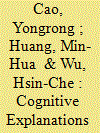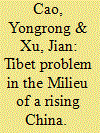| Srl | Item |
| 1 |
ID:
179268


|
|
|
|
|
| Summary/Abstract |
In recent years, the economic development of China and India and their border confrontations have intensified bilateral strategic competition. This study used the State of Democracy in South Asia survey to identify dual mindsets of competition and contingency that drive how Indians perceive China’s influence in Asia. These two mindsets are based on a cognitive schema characterized by a political predisposition against China. However, this negative orientation is moderated as more information is acquired regarding the impact of China on India. The competition mindset does not always manifest itself, and is only cognitively activated when a change is perceived in India’s power status. On the other hand, the contingent principle appears whenever competition seems to have abated, or disadvantage seems unavoidable. The mindsets of competition and contingency are not only relevant to the evolution of Sino–Indian relations, but also explain how Indian policymakers behave and respond in international society.
|
|
|
|
|
|
|
|
|
|
|
|
|
|
|
|
| 2 |
ID:
137451


|
|
|
|
|
| Summary/Abstract |
The Lhasa riots in 2008 re-captured the world's attention on the Tibet problem. As China continues to grow as a rising power, it raises a concern over whether the perception of a rising China will affect how American people think about the Tibet problem. In this article, the authors apply public opinion data to evaluate this question. The results show that the perception of China's hard power or soft power has little influence on Americans' view of the Tibet problem, while factors of political values and China's policy stance matter greatly. Our findings suggest that the huge difference in political values between the PRC and the US makes it tough for both sides to agree on a resolution to the Tibet problem. In the long term, China needs to improve its human rights record and present itself as a responsible great power to win over the hearts of foreign publics rather than conduct a public relations campaign according to its own imagination.
|
|
|
|
|
|
|
|
|
|
|
|
|
|
|
|